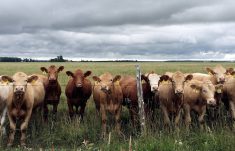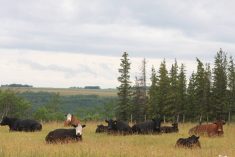It’s been an interesting few years. Since March of 2020, it seems in some ways like decades have passed.
Perhaps that’s the way it goes when you’re forced to spend too much time alone at home, in your own company. But every now and then a milestone passes, and I realize the whole experience of the COVID-19 pandemic hasn’t even hit the three-year mark.
The most recent example happens this week at the Keystone Centre, with the return of Ag Days for the first time since January 2020.
Read Also

R-Tech fence mower wins for farm safety innovation at Ag Days
R-Tech fence mower wins 2026 Ag Days Innovation Showcase farm safety category for labour saving fenceline mower
It’s almost impossible to believe it was just a year ago that the province entered another lockdown because the Omicron variant had reared its ugly head. Despite immunizations, it was evading immunity and spreading rapidly. Thankfully, early reports that it was relatively mild proved accurate for the most part.
But the provincial government couldn’t know that at the time, so in an abundance of caution, it chose to again limit the size of public gatherings and enforce mask mandates.
One wouldn’t want to jinx our good fortune by making definitive statements, but it does appear we’re firmly into the post-pandemic period.
The virus is still out there circulating. And much was made in a recent news cycle of the fact that more Manitobans died of COVID-19 in 2022 that in either of the first two years of the pandemic.
The province reported 939 COVID-19 deaths in 2022 compared to 731 in 2021 and 661 in 2020. But buried in there is the fact that a whole lot more people had COVID-19 in 2022, thanks to the fast-spreading nature of the variants we saw this past year. By the end of this summer, researchers in B.C. suggested that more than two-thirds of Canadians had antibodies from natural infections, up dramatically from the start of the year.
All in all, most Manitobans seem pretty content with the risk level, making it unlikely there will be significant future lockdowns or limitations. That could change, of course, were the virus to mutate into something more acute with a higher level of danger.
But that ignores the fact that viruses don’t typically seem to go in that direction. Two examples are the Spanish and Russian flus.
The Spanish flu killed millions in the wake of the Great War, and is with us today. But it has faded into the background to become just another in the pantheon of viruses that periodically sicken humanity. It circulated widely throughout the 1920s in successively less-virulent waves.
The Russian flu is a bit more obscure, but probably a better parallel, as it too was caused by a coronavirus, the most recent research suggests. It struck in 1889-90, and is estimated to have killed a million people globally. Today research suggests it is part of the complex of viruses that cause the common cold.
With that in mind, it seems our society is going to get on with things, and a big part of getting on with it will be unlearning some of the bad habits we’ve picked up over the course of the pandemic.
Drug and alcohol use apparently skyrocketed, likely due to that strange combination of stress and boredom we all suffered. Sandals and socks are apparently OK these days, and sweat pants are just pants now.
Perhaps most crucially, more than a few of us seem to have gotten a bit too comfortable in our own company.
Getting out and taking part in society is important for our mental health. We’re social creatures and there are many mental health benefits to be had from friendships and community involvement.
I personally discovered an introverted side of my personality that I didn’t even know existed, and these days, when I get an invitation, it can be a bit of an exercise to talk myself into accepting.
After all, it’s cold out, there’s hockey on TV, and the beer and wings are cheaper here at home.
But I also find that, when I do make the effort to get out, I return reinvigorated and reconnected to my community.
Ag Days is a great chance to reconnect, and I hope by the time many of you read this, I’ve had a chance to see you at the show.
I also find myself looking forward to the busy winter meeting season ahead. Some years it can seem like a bit of a grind, but this year it will seem like a triumphant victory tour as we put the pandemic in the rear-view mirror.
We at the Co-operator would be interested to hear what you’re most looking forward to as we move into this new and hopefully brighter post-pandemic period.
My email is below. Drop us a line and let us know. In the meantime, enjoy the shows and meetings that are ahead because it turns out songstress Joni Mitchell had it right. You really don’t know what you got, ‘til it’s gone.
















